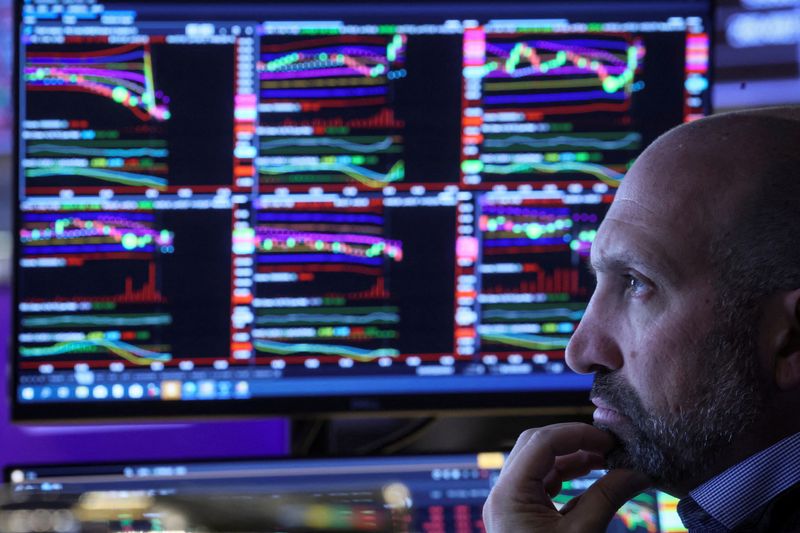By Lewis Krauskopf
NEW YORK (Reuters) -As a strong year in U.S. stocks comes to a close, fund managers face a potentially consequential choice in 2024: stick with the few massive growth and technology names that have powered equity indexes higher, or take a shot on the rest of the market.
Shares of the so-called Magnificent Seven – Apple (NASDAQ:AAPL), Microsoft (NASDAQ:MSFT), Alphabet (NASDAQ:GOOGL), Amazon (NASDAQ:AMZN), Nvidia, Meta Platforms and Tesla (NASDAQ:TSLA) – individually soared between around 50% and 240% in 2023, making them among the market's most rewarding bets.
Because of their heavy weightings in the S&P 500, the seven were responsible for nearly two-thirds of the benchmark index's 24% gain this year, data earlier this month showed.
The S&P 500's gain was its biggest since 2021. The Nasdaq Composite, which has a heavier focus on tech, surged 43.4% this year, its biggest annual rise since 2020.
Not surprisingly, fund managers in BofA Global Research's most recent survey said owning the seven stocks was the market's "most crowded" trade.
But expectations that the Federal Reserve will cut interest rates next year while the economy avoids recession have awoken other parts of the market in recent weeks. Meanwhile, some investors say the huge rallies in the seven may have left them overvalued or vulnerable to profit-taking.
"When you have seven companies that are huge in the index all going up, that is good for the market," said Jonathan Cofsky, portfolio manager for the Global Technology and Innovation team at Janus Henderson Investors. "But I think there are probably more opportunities in the rest of the market, depending on rates and the economy."
Data earlier this week from the Apollo Group showed 72% of the S&P 500's stocks underperformed the index this year, a record.
However, there are signs the rally is broadening. The equal-weight S&P 500 -- a proxy for the average stock -- climbed 6.7% in December against a 4.5% rise for the standard index, after lagging most of the year.
Meanwhile, the previously sluggish small-cap Russell 2000 soared 12% in December, its biggest monthly gain in three years.
With the weighting of the Magnificent Seven in the S&P 500 swelling, a bad year for the group could spell trouble for the broader market if other stocks don't take up the slack.
Other important factors for the market next year include whether inflation continues to ebb, allowing the Fed to cut rates at the pace markets expect, as well as the continued resilience of the U.S. economy. The run-up to the U.S. presidential elections in November also could increase market volatility.
Of course, other areas of the market might struggle to replicate features that attracted investors to the seven in the first place. Their size and competitive advantages made them a refuge for investors worried about economic fallout from aggressive monetary policy tightening the Fed embarked on to calm surging inflation.
Excitement over the business potential from emerging artificial intelligence technology also helped propel some of the megacaps in 2023, including Nvidia and Microsoft, which jumped 239% and 57%, respectively.
Another factor is profitability: the Magnificent Seven are expected to post a 39.5% aggregate earnings increase in 2023, against a 2.6% decline for the rest of the S&P 500, according to LSEG data. Their earnings growth is expected to outperform again in 2024, albeit by a lesser extent.
But the Magnificent Seven stocks are trading at more expensive valuations overall after their gains. According to LSEG Datastream, they recently traded at an average forward price-to-earnings ratio of 33.6 times, while the S&P 500 was at 19.8 times.
"They don't get the low-hanging fruit of coming into this year weak as ... a starting point," said Matt Benkendorf, chief investment officer of the Vontobel Quality Growth Boutique.
Vontobel Quality Growth holds Microsoft, Amazon and Alphabet in its portfolios, but not the other four companies where Benkendorf sees more operating challenges.
Cofsky, meanwhile, said his funds own at least some of the Magnificent Seven but he sees potential rotation into small or mid-cap tech stocks in 2024 if rates continue to moderate.
BMO (TSX:BMO) Capital Markets strategist Brian Belski recommended investors own "a little bit of everything" in the coming year, given his "expectation for individual stock participation to broaden significantly," following narrow breadth relative to history in 2023.
Others believe the Magnificent Seven will continue drawing investors hoping for a repeat of their performance this year.
The Magnificent Seven's dominance in key indexes means they are widely owned by mutual funds and ETFs and may benefit as money comes off the sidelines into stocks, said Francisco Bido, senior portfolio manager at F/m Investments.

He counts all of the seven as long-term holdings in his portfolios, except for Tesla.
"It's a little bit of a feedback loop," Bido said. "They get bigger, people want even more."